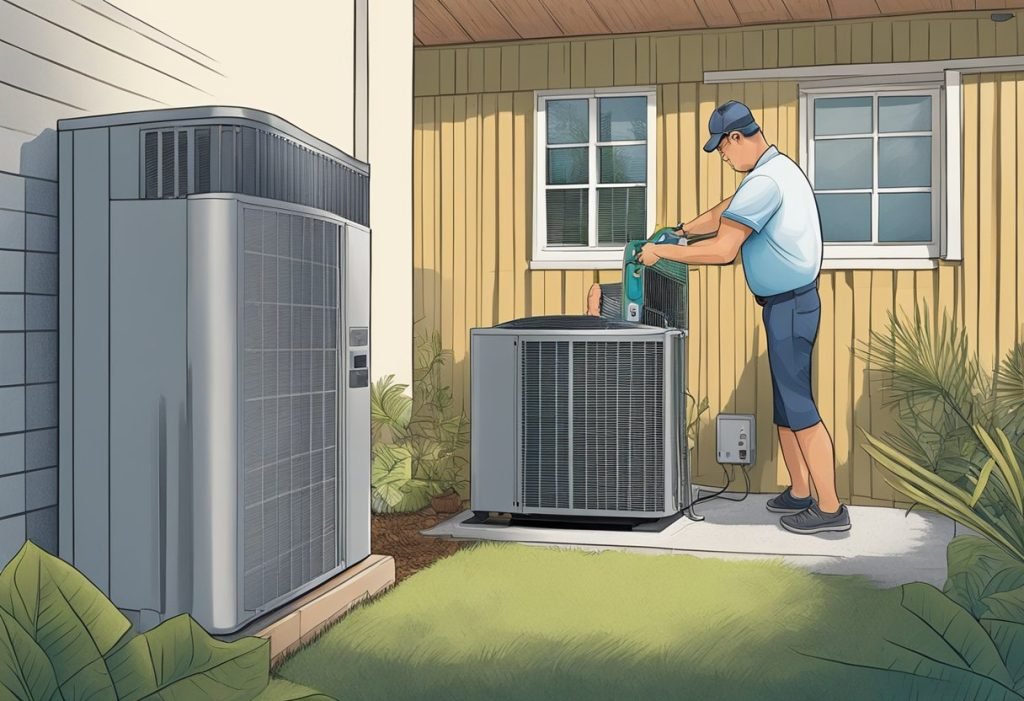Last Updated on March 18, 2024 by Kelvin Nielsen
Florida landlords have a legal obligation to provide air conditioning for their tenants. This is because the state of Florida recognizes air conditioning as a basic necessity for comfortable living.
As a landlord, it is important to ensure that your rental property meets the state’s air conditioning requirements to avoid legal complications.

According to Florida law, landlords are required to provide air conditioning that is in good working condition. This means that the air conditioning unit must be able to maintain a temperature of 80 degrees Fahrenheit or lower during the summer months.
Failure to comply with this law can result in fines and legal action from tenants.
Related Posts:
- Landlord Rights in Florida: A Comprehensive Guide
- How Long Does a Landlord Have to Fix Something in Florida?
Landlord Responsibilities for Habitability
As a landlord in Florida, you have certain responsibilities to ensure that your rental property is habitable for your tenants. These responsibilities include maintenance and repairs, complying with legal requirements and regulations, ensuring tenant rights and remedies, and meeting safety and health standards.
Maintenance and Repairs
Under Florida law, you are required to maintain and repair your rental property in a timely manner. This includes ensuring that the AC system, ducts, plumbing, and electrical systems are in good working order.
You are also responsible for maintaining the sanitary and structural components of the property, as well as keeping it clean and free of garbage and pests.
Safety and Health Standards
In addition to your repair and maintenance responsibilities, you are responsible for ensuring that your rental property meets safety and health standards.
This includes ensuring that smoke detectors are installed and functioning properly, and that the property is free from hazards such as mold, lead paint, and asbestos. It is also important to ensure that any appliances, hot water, and HVAC systems are in good working order.
Related Posts:
- Can a Landlord Enter Without Permission in Florida?
- Florida Landlord-Tenant Law Utilities
- Florida Landlord Responsibilities
Tenant Responsibilities Regarding Habitability
As a tenant, you have certain responsibilities when it comes to maintaining the habitability of your Florida apartment. By taking care of your living space, reporting issues and damages, and complying with lease terms, you can help ensure a comfortable and safe environment for yourself and your family.
General Upkeep and Cleanliness
It is your responsibility to keep your apartment clean and sanitary. This includes properly disposing of garbage and trash, and keeping the common areas of the building clean.
Additionally, you should take steps to prevent pests such as ants, rats, mice, and roaches from entering your apartment.
Reporting Issues and Damages
If you notice any damage or issues in your apartment, it is important to report them to your landlord or property manager as soon as possible. This includes damage to the AC, plumbing, and electrical systems.
By reporting issues promptly, you can help prevent further damage and ensure that repairs are made in a timely manner.
Compliance with Lease Terms
Finally, it is important to comply with the terms of your lease or rental agreement. This includes paying rent on time, not damaging the apartment or common areas, and following any rules or regulations set forth in the lease.
Failing to comply with these terms may result in eviction or other legal consequences.
Related Posts:
Frequently Asked Questions
What are landlords’ responsibilities regarding air conditioning maintenance in Florida?
As a landlord in Florida, you are responsible for maintaining the air conditioning system in your rental property. This includes repairing and replacing the unit if necessary.
You must also ensure that the system is in good working order before a new tenant moves in. Furthermore, have the system inspected and serviced by a licensed professional at least once a year.
Is air conditioning considered a required utility under Florida landlord-tenant law?
Yes, air conditioning is considered a required utility under Florida landlord-tenant law. This means that you must provide a working air conditioning system in your rental property, especially during the hot summer months.
Failure to do so may result in legal action being taken against you by your tenants.
How soon must a landlord repair a broken air conditioning unit in Florida rental properties?
As a landlord in Florida, you are required to repair a broken air conditioning unit as soon as possible. However, the law does not specify a specific timeframe for repairs. Ideally, make the repair within a reasonable amount of time, taking into consideration the severity of the problem and the availability of repair services.
Can tenants withhold rent if the air conditioning is not fixed in a timely manner in Florida?
Yes, tenants in Florida have the right to withhold rent if the air conditioning is not fixed in a timely manner. However, they must follow the proper legal procedures and provide written notice to the landlord before doing so.
It is important to address any air conditioning issues promptly to avoid any potential legal disputes with your tenants.
What constitutes an emergency repair for air conditioning units in Florida rentals?
Emergency repairs for air conditioning units in Florida rentals are those that affect the health or safety of the tenants. This includes situations where the temperature inside the rental property reaches a dangerous level, such as during a heat wave. In such cases, the landlord must make the necessary repairs as soon as possible.
Are there any new Florida laws that affect air conditioning requirements for rental properties?
As of the current date, there are no new Florida laws that affect air conditioning requirements for rental properties. However, it is important to stay up-to-date with any changes in the law that may affect your responsibilities as a landlord.
Related Posts:
- What Are My Legal Rights as a Tenant in Florida?
- Florida Landlord Right to Show Property
- Landlord Harassment in Florida
Disclosure: The content herein isn’t a substitute for advice from a professional attorney. It’s only meant to serve educational purposes. If you have a specific question, kindly seek expert attorney services.
Sources: FL Statutes Chapter 83 Part II, Warranty of Habitability in Florida, Florida Renters Rights Guide

Amanda Rose is a seasoned landlord with 13+ years of expertise in overseeing diverse properties. Her adept management spans single and family homes, along with multi-family apartments and condos, across Wyoming and South Dakota. Her commitment and proficiency have cemented her status as a thriving property management professional.
She is a member of the following organizations: Wyoming Landlord’s Association, National Association of Residential Property Managers (NARPM), Wyoming Apartment Association, South Dakota Multi-Housing Association (SDMHA), and South Dakota Landlord Association (SDLA).







